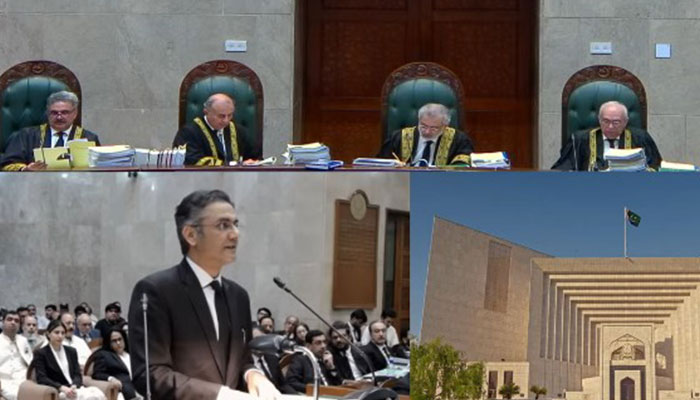Justice Minallah says fact ECP misinterpreted SC verdict
"Should the court give its validation to unconstitutional interpretation done by constitutional body? " asks judge
ISLAMABAD: Supreme Court's Justice Athar Minallah on Tuesday underscored that it was a "proven fact" that the Election Commission of Pakistan (ECP) misinterpreted the apex court's verdict wherein it had denied the Pakistan Tehreek-e-Insaf (PTI) of its "bat" symbol over failure to hold valid intra-party polls.
"Should the court give its validation to an unconstitutional interpretation done by a constitutional body? [...] Do you want us to revive the doctrine of necessity?" the judge said.
Justice Minallah's remarks came during a full court's 13-member bench's hearing of the Sunni Ittehad Council's (SIC) plea against the Peshawar High Court's (PHC) verdict upholding the Election Commission of Pakistan's (ECP) decision denying them the reserved seats.
The bench, led by Chief Justice of Pakistan (CJP) Qazi Faez Isa, comprises Justice Syed Mansoor Ali Shah, Justice Muneeb Akhtar, Justice Yahya Afridi, Justice Amin-ud-Din Khan, Justice Jamal Khan Mandokhail, Justice Muhammad Ali Mazhar, Justice Syed Hassan Azhar Rizvi, Justice Shahid Waheed, Justice Irfan Saadat Khan and Justice Naeem Akhtar Afghan.
During the hearing today, Attorney General of Pakistan (AGP) Mansoor Usman argued that independent candidates are considered to be a part of a political party if they join it.
"The question is whether independent candidates can join the SIC under Article 51? the AGP said.
At this, Justice Minallah stressed that a political party has rights under Article 51 of the Constitution and remarked that people voted for a political party, however, the ECP excluded a political party from the polls.
The attorney general further contended that independent candidates can neither form a parliamentary party nor they can join a political party which doesn't have the status of a parliamentary party.
Additionally, SIC lawyer Faisal Siddiqui submitted the notification issued by the National Assembly Secretariat regarding Zartaj Gul's appointment as parliamentary leader and argued that the ECP — in its response — acknowledged the independent candidates' joining of the SIC.
This prompted Justice Muneeb to remark that the electoral body was in fact accepting the independent candidates as belonging to the SIC.
"Now, the ECP's own record is accepting these people as belonging to the SIC […] tell me how is the ECP depriving them of the reserved seats despite acknowledging them as a parliamentary party?" the judge questioned, adding that independent candidates become a parliamentary party if they join a political party.
Furthermore, Justice Ayesha questioned how could the electoral body consider the SIC a parliamentary party when it doesn't regard it as a political party in the first place.
The court then adjourned the case till July 9.
The reserved seats saga
The reserved seats issue had arisen after the PTI-backed independent candidates emerged victorious in the February 8 elections and subsequently joined the SIC in a bid to claim seats reserved for minorities and women.
The PTI, however, failed to secure the reserved seats as the ECP, citing the party's failure to submit its list of candidates, denied allocating the reserved seats to the SIC.
Subsequently, the PHC also upheld the electoral body's decision on the matter after which the issue ended up in the SC.
The ECP, in its submission to the apex court, has argued that the SIC does not qualify for reserved seats as the political party doesn't allow non-Muslims to be a part of it.
The ECP informed the top court that the reserved seats could not be allotted to the SIC as the party did not submit the list of candidates before the January 24 deadline.
The whole reserved seats issue holds significance as the PTI-backed independent candidates, who make up the majority of the opposition benches, lost as many as 77 reserved seats in NA and provincial assemblies due to the PHC's verdict.
Furthermore, the government has also urged the SC to reject the SIC's appeal seeking the allocation of reserved seats for women and minorities in the National and provincial assemblies.
The 30-page written submission argues that the reserved seats for minorities and women could be given to a political party which contested the polls and won at least one seat besides providing a list of candidates based on the total number of seats it won as per the law.
Meanwhile, the PTI has also moved the SC seeking to become a party in the said case with the petition arguing that they and the SIC were deprived of reserved seats despite being eligible.
The SIC was ready to provide a list of candidates for the allocations but was denied permission to submit it, the plea argues.
-
Security forces gun down 30 terrorists in multiple IBOs in KP: ISPR
-
MQM-P calls for new province in Sindh
-
US report validates Pakistan military edge over India: PM
-
Banned TTP poses serious threat to Pakistan security: UNSC panel
-
CM Afridi clarifies remarks on by-poll after ECP requests army deployment
-
Dubai sees 3.2m Pakistani passengers in 2025 as airport sets new milestone
-
Security forces kill 23 Indian proxy terrorists in KP's Kurram
-
Pakistan to construct island to boost oil exploration: report












